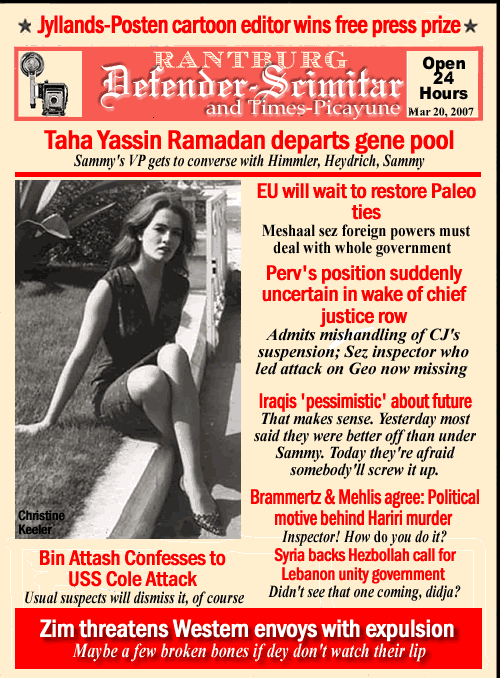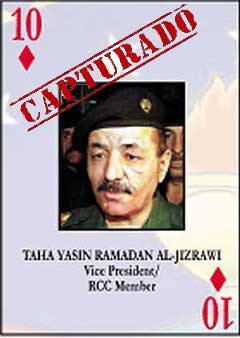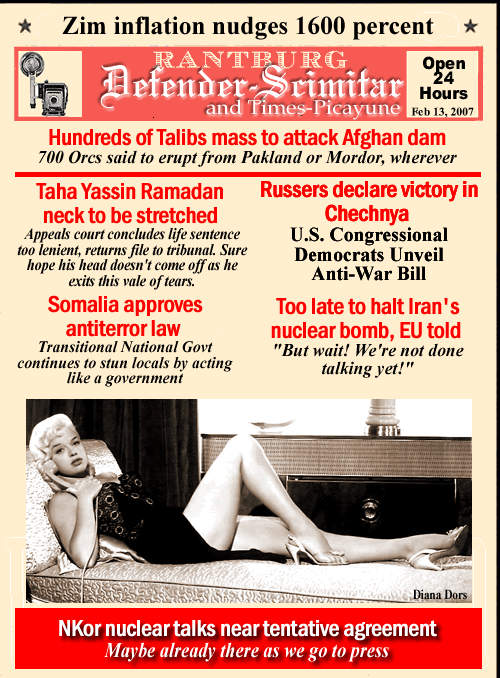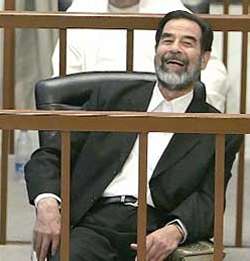 Iraq's presidential council has endorsed the execution within a month of Saddam Hussein's cousin, known as "Chemical Ali," for his role in the 1980s scorched-earth campaign against Kurds, officials said Friday. But it spared the life of two other officials amid Sunni protests that they were only following orders.
Iraq's presidential council has endorsed the execution within a month of Saddam Hussein's cousin, known as "Chemical Ali," for his role in the 1980s scorched-earth campaign against Kurds, officials said Friday. But it spared the life of two other officials amid Sunni protests that they were only following orders.The approval by Iraq's President Jalal Talabani and two vice presidents was the final step clearing the way for Ali Hassan al-Majid's execution by hanging. It could now be carried out at any time, a government adviser and a prosecutor said.
Al-Majid was one of three former Saddam officials sentenced to death in June after being convicted by an Iraqi court of genocide, war crimes and crimes against humanity for their part in the Operation Anfal crackdown that killed nearly 200,000 Kurdish civilians and guerrillas.
Al-Majid was nicknamed "Chemical Ali" for ordering poison gas attacks that killed thousands.
The officials said the three-member presidential council agreed to al-Majid's execution, but did not approve death sentences against the other two Hussein Rashid Mohammed, an ex-deputy director of operations for the Iraqi armed forces, and former defense minister Sultan Hashim al-Taie.
The fate of the men who are in U.S. custody had been in legal limbo since this summer and the decision could represent a compromise to ease Sunni objections to executing al-Taie, widely viewed as a respected career soldier who was forced to follow Saddam's orders in the purges against Kurds.
Al-Majid would be the fifth former regime official hanged for alleged atrocities against Iraqis during Saddam's nearly three-decade rule.
Saddam, who also had been a defendant in the so-called Anfal trial, was hanged Dec. 30, 2006, for ordering the killings of more than 140 Shiite Muslims from the Iraqi city of Dujail following a 1982 assassination attempt against him.
A government adviser, who spoke on condition of anonymity because he wasn't authorized to release the information, said Prime Minister Nouri al-Maliki and U.S. officials had been informed of the decision by phone and that a meeting was planned to decide when and where the execution should take place.
A senior U.S. military official said the military was
The other two men remain in U.S. custody but are under the jurisdiction of the Iraqi government, the official said, declining to be identified ahead of an official announcement.
Prosecutor Jaafar al-Moussawi, who said he had received word of the decision from the presidential council, said there was a legal basis for the execution of "Chemical Ali" but not of the other two.
He said no law existed that could force the presidential council to endorse the execution of all three, so it had the prerogative to just sign off on one of the orders.
An appeals court upheld the verdicts against the three in September. Under Iraqi law the executions were to have taken place within a month. But they were put on hold after Sunni leaders including Vice President Tariq al-Hashemi launched a campaign to spare the life of al-Taie.
President Jalal Talabani, himself a Kurd, had also refused to sign the order against al-Taie, a Sunni Arab from the northern city of Mosul who signed the cease-fire with U.S.-led forces that ended the 1991 Gulf War.
Al-Taie surrendered to U.S. forces in September 2003 after weeks of negotiations. His defense has claimed the Americans had promised al-Taie "protection and good treatment" before he turned himself in.
Many Sunni Arabs saw his sentence as evidence that Shiite and Kurdish officials are persecuting their once-dominant minority and as a sign of Shiite influence over the judiciary, raising concerns the executions could ignite retaliatory sectarian attacks.
The case also strained relations between al-Maliki's Shiite-led government and U.S. officials. In late November, the Shiite prime minister asked President Bush to hand over "Chemical Ali" and the other two former regime officials.
The officials said al-Hashemi had refused to agree to the executions of the other two because he considered them career soldiers following orders.
There have been few calls for leniency, however, regarding al-Majid.
Saddam's half-brother and former intelligence chief Barzan Ibrahim, and Awad Hamed al-Bandar, former head of Iraq's Revolutionary Court, were hanged in January 2007.
Saddam's former vice president, Taha Yassin Ramadan, had been sentenced to life in prison for his role in Dujail but was executed in March after the court decided this was too lenient. Three other defendants were sentenced to 15 years in jail in the Dujail case, while one was acquitted.

 BAGHDAD -- Four years after Saddam Hussein's ouster, Iraq's new judiciary is dismantling piece by piece the remnants of the dictator's ruthless regime built up over a quarter of a century. The executed president's inner circle of family members and many of his cronies - mostly Sunni Arabs from the Tikrit region of northern Iraq - have been hunted down and are being sent to the gallows one by one.
BAGHDAD -- Four years after Saddam Hussein's ouster, Iraq's new judiciary is dismantling piece by piece the remnants of the dictator's ruthless regime built up over a quarter of a century. The executed president's inner circle of family members and many of his cronies - mostly Sunni Arabs from the Tikrit region of northern Iraq - have been hunted down and are being sent to the gallows one by one. 



 The procedure through which ousted Iraqi leader Saddam Hussein will appeal against his death sentence began on Monday, with officials saying he may face the gallows within the next few months.
The procedure through which ousted Iraqi leader Saddam Hussein will appeal against his death sentence began on Monday, with officials saying he may face the gallows within the next few months.